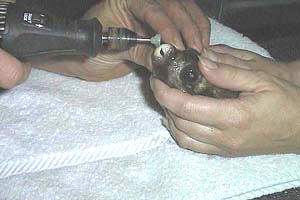Here's what I would recommend:
-purchase a bottle of clove oil
-check the euthanasia sticky in the sickfish forum
-I would use thouse recommendations for amounts, BUT, the sticky doesn't seem to take into account you need to dissolve the clove oil in alcohol PRIOR to adding to the tank. I'm sure some of it will still dissolve but I've read it works much better to use a solvent first.
-After the fish is asleep for 30min or so (you could probably do it sooner but why risk it), I'd probably freeze the fish. By this point the fish should not suffer at all since its essentially in a comatose state. Unlike paralyzing agents, clove oil is a numbing agent so they will feel no pain.
With smaller fish I still prefer the wacking with a large object approach due to it instantly killing the fish with no suffering (a large piece of flat slate or stone is the best since aiming is a non-issue), but with larger species the clove oil is probably the most humane.
EDIT:
This is the excerpt from the clove oil method:
"Clove Oil can be found relatively cheap in most health food stores, specialty food stores, and pharmacies. Mix it with warm tank water, and shake. Note, that the Oil is not readily dissolved in water, which is why the shaking is very important. The water will eventually turn white when the correct amount of clove oil has been added. Add the fish to this mixture, and it will slowly die from an overdose of this anesthetic oil. More clove oil may need to be added after the fish is in the solution, so my advice is to not skimp on the initial mixture. ¼ teaspoon per gallon of water is the lethal dosage, however more may be used.
After the fish appears dead, it would be best to either freeze the fish or decapitate it, as fish have been known to “wake up” after deep sleep, and supposed death from anesthetics. "
Again I would recommend FIRST dissolving the clove oil in a small amount of alcohol, and THEN following the directions as listed above.
EDIT #2:
This is exactly what I was looking for:
http://www.aquatic-hobbyist.com/profiles/misc/cloveoil.html
